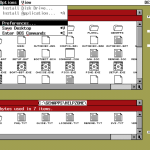
Machine learning, concluded: Did the “no-code” tools beat manual analysis?
In the finale of our experiment, we look at how the low/no-code tools performed.

In the finale of our experiment, we look at how the low/no-code tools performed.

In the second part of this three-part series, our heart attack predictions take flight.

In part one of three, we give the cloud a new problem to (heart) attack.

At Ars Frontiers, Lesley Carhart spoke about the systems that make our world work.

Recapping our Ars Frontiers talk with a half-dozen information security experts.

We tear down some infosec conventional wisdom—there's a lot of bad advice out there.

Phone scams, targeted phishing, and... pig butchering? The future is kind of scary.

"Any sensor, any shooter" means more fighting flexibility—and more complexity.

We did the basics—now let's look at some more detailed steps to protect yourself.

In this first of two parts, we go over some security steps everyone should be taking.

Turns out it's really hard to make a machine-learning model to evaluate headlines.

In part three of four, we look at what's gone right, and what's gone... less than right.

In part two of our series, we attempt to learn the ways of the machine.

In the first part of a new series, we look at matching the problem to the tool.

From the archives: Open source MS-DOS alternative lives—but using it nearly killed me.

Cost overruns, other issues prompt Air Force to look for "clean sheet" fighter.

In this installment of SitRep, we look at the 707's longevity as a military workhorse.

Joint All-Domain Command & Control ("JADC2") is the new hotness—but will it really work?

Since the end of World War II, the US and allies have tried to network-enable war.

From the archives: Teddy Ruxpin + Arduino + Raspberry Pi + Alexa = What could go wrong?

From the archives: Say hello to the KGB software model that forecasted mushroom clouds.

It’s no longer just about issuing a laptop—the world and our requirements have changed.

Video: Drones built by Turkey are dominating the Azerbaijani-Armenian war.

There's no more perimeter, everybody's Wi-Fi is broken, and yet...we're still working.

Finding the right balance between collaboration and privacy is suddenly critical.

AI-powered “attritable” drones give flying adversaries something else to shoot at.

New processor, mission software, and a rewrite of F-35's maintenance system are due.

“It will suck, until it suddenly stops sucking.”

Forget the utopian visions—nothing ever happens neatly, or without struggle.

In a world where you have to social distance, how do you scrum?

Or, how to work at home for the long haul without violating workplace health and safety laws.

Wisconsin subsidiary of shipbuilder Fincantieri to build FREMM-based FFG(X).

From the archives: In some ways, new Navy computers fall short of the power of 1930s tech.

Navy Secretary: "We... expect more from the Commanding Officers of our aircraft carriers."

Rohrabacher offered Assange a pardon if he implicated Seth Rich in DNC email leak.

In London court, attorney claims that congressman's visits were to broker deal.